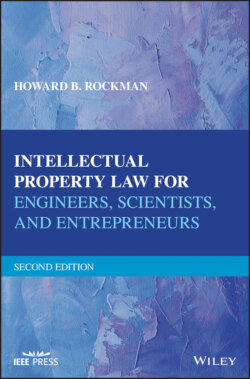Читать книгу Intellectual Property Law for Engineers, Scientists, and Entrepreneurs - Howard B. Rockman - Страница 42
2.10.2 Courts of Appeals
ОглавлениеThe Courts of Appeals of the federal judicial system normally consist of three‐judge panels, which were first established by Congress in 1891 because of the burden of appeals on the U.S. Supreme Court. The appellate courts do not conduct trials, and disputes between parties are appealed only on the basis of a conflict in the interpretation of the law. The facts decided previously in a lower court are not changed by the Court of Appeals. As a general rule, an appellate court does not have the ability to make an adverse decision regarding a fact established in a lower court.
The Court of Appeals for the Federal Circuit (“CAFC”) is a U.S. Court of Appeals with a primary facility in Washington, D.C. The CAFC was created by Congress in 1982, which merged the then‐existing U.S. Court of Customs and Patent Appeals and the appellate division of the U.S. Court of Claims. Of particular importance, the CAFC is the only appellate‐level U.S. court with the jurisdiction to hear and decide appeals in patent lawsuits originating in any one of the U.S. district courts.
A unique feature of the CAFC is that it is the only appeals court in the federal judicial system whose jurisdiction is based wholly upon subject matter, rather than on geographic location.
The CAFC has exclusive appellant jurisdiction over appeals from:
1 U.S. district court cases relating to patents.
2 The U.S. Patent Trial and Appeal Board.
3 The U.S. Trademark Trial and Appeal Board.
4 Appeals arising from an action against the Commissioner of Patents and Trademarks where the USPTO has refused to issue a patent.
5 The U.S. Court of International Trade, which hears cases involving the importation of foreign goods that have been alleged to infringe one or more U.S. patents, trademarks, or copyrights.
6 Appeals from several government tribunals that do not involve intellectual property.
Decisions by the CAFC in patent cases are binding precedent in other patent cases heard in all of the district dourts throughout the United States. Only the U.S. Supreme Court, or Congress, can reverse or change a decision by the CAFC in a patent case.
